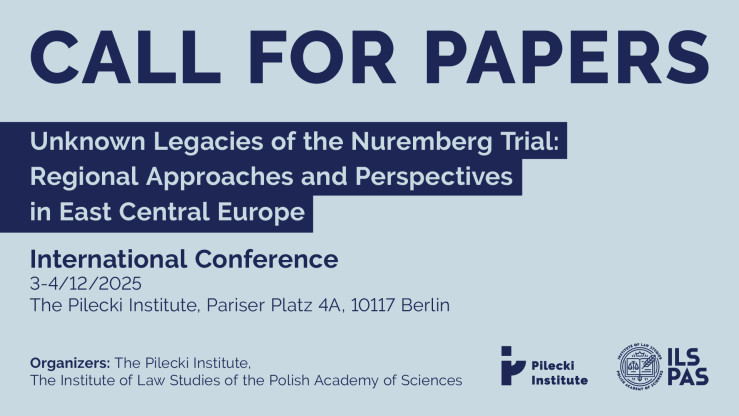CALL FOR PAPERS: The 80th Anniversary of the Nuremberg Trial - Instytut Pileckiego
12.09.2025 (Fri) 23:59
CALL FOR PAPERS: The 80th Anniversary of the Nuremberg Trial
Application deadline: 12 September 2025

CALL FOR PAPERS
Unknown Legacies of the Nuremberg Trial: Regional Approaches and Perspectives in East Central Europe
The year 2025 marks the 80th anniversary of the beginning of the work of the International Military Tribunal (IMT) at Nuremberg - a landmark series of trials in the development of international criminal law and a key juncture in confronting the crimes committed during the Second World War, as well as in reconstructing the post-war global order. The principles of international law adopted in the Statute of the IMT (the Nuremberg Charter) and the IMT verdict of 1 October 1946 were endorsed by the UN General Assembly in its resolution of 11 December 1946. These principles then went on to be referenced repeatedly in the work of the International Law Commission. Even during the IMT and the subsequent Nuremberg trials, these principles significantly guided strategies for prosecuting and punishing Axis crimes - both before the national courts of the Allied states and within the proceedings of the International Military Tribunal for the Far East.
The Nuremberg Charter pertained to the prosecution and punishment of the major war criminals of the European Axis and was part of an agreement concluded on 8 August 1945 between the governments of Great Britain, the United States, the Union of Soviet Socialist Republics, and the Provisional Government of the French Republic. However, there were no representatives of the occupied European countries that had experienced the greatest wartime atrocities - and on whose territories mass crimes had been committed, including Poland - either among the authors of the agreement or among the judges and prosecutors of the Nuremberg Tribunal.
Nevertheless, representatives of these countries contributed significantly to Allied efforts to prosecute and punish perpetrators of international crimes, including through their involvement in the United Nations War Crimes Commission in 1943. Their achievements also held significant sway in the development of international law after 1945 - beginning with their cooperation in the Nuremberg trials and continuing with the creation of the Convention on the Prevention and Punishment of the Crime of Genocide and the Convention on the Non-Applicability of Statutory Limitations to War Crimes and Crimes Against Humanity. While crucial to the development of international law, this body of work remains little known and is often overlooked - largely due to the post-war transformation of these nations into Soviet satellite states. Today, we are only beginning to discover their impact by linking it to the legacy of the Nuremberg trials and the adjudication of international crimes in the 20th century. These influences directly shaped the concepts that paved the way for the creation of the International Criminal Court in 2002.
Another still under-researched factor shaping the course of post-war justice after 1945 is the context of the Cold War and the deep polarization between Eastern and Western Bloc countries during the Nuremberg trials. This led, among other consequences, to the suspension of extraditions of war criminals prosecuted in Poland, Czechoslovakia, and Yugoslavia. From both local and international perspectives, knowledge about the regional dimensions of trials of war criminals and suspected collaborators remains limited. The extent to which prevailing political narratives hindered cooperation between states in the prosecution of perpetrators also remains to be fully assessed.
The purpose of the conference is to present the latest research and to encourage international scholars to reflect on the legacy of the Nuremberg Trials, the specific features of war crimes trials in Central and Eastern Europe, and the current state of research on the prosecution of those suspected of international crimes. What is needed today is a critical analysis of the initiatives undertaken during and after the war, taking into account regional narratives and the actual influence of states on the development of international criminal law.
Application deadline: 12 September 2025
Please send your paper proposal (max. 300 words) and a short bio note to: conference@pileckiinstitut.de
Admission notification: by 30 September 2025
Conference Date: 3-4/12/2025
We are planning to publish an edited volume devoted to the conference topic. Authors of the conference papers will be asked to submit their chapter manuscripts by 15 March 2026.
The conference proceedings will focus on the following thematic areas:
- 80 years of the IMT Charter and the Nuremberg trial;
- The genesis of Nuremberg (Potsdam Conference, London Conference, pre-1945 initiatives);
- Errors and shortcomings of the Allied project for the settlement of international crimes (exclusion of “small states” from the IMT, failure to adjudicate the crimes of the USSR);
- The contribution of lawyers from Poland and other Eastern European countries;
- Biographical research in the history of international law;
- Trials of war criminals after the Second World War in the shadow of the Cold War;
- Modes and strategies of the post-war justice in Eastern and Western Europe;
- The principles of fair trial behind the Iron Curtain;
- Compensation for victims;
- The application of Nuremberg principles before national courts in post-1945 Trials
- The legacy of Nuremberg – contemporary challenges in prosecuting the perpetrators of the gravest crimes;
Developed by: Dr. Dominika Uczkiewicz, Prof. Karolina Wierczyńska
Organized by the Pilecki Institute in academic cooperation with the Institute of Law Studies of the Polish Academy of Sciences